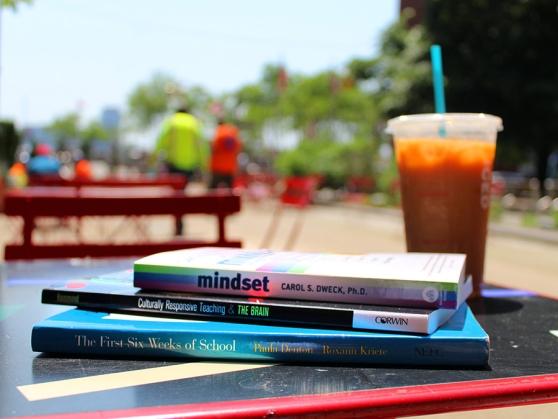
Educators need the summer months to rest and recharge. But it’s also a good idea to fit in a few books about teaching when you have the time and mental space to absorb new information and reflect on your practice. That’s why we contacted UFT Teacher Center field liaisons and site coaches for their reading suggestions. They were happy to share the books they read over and over that have helped them to develop expertise and confidence.
So when you’re packing your beach bag in July, be sure to tuck in a copy of one or two of these books, which are all chockablock with tips, tricks and strategies you can put into practice in September.
“Teaching Children to Care: Classroom Management for Ethical and Academic Growth,” K-8, by Ruth Sidney Charney. As anyone who’s taught for even a single day knows, classroom management is foundational to all learning — and it’s one of the hardest skills for new teachers to acquire. “The text is full of practical, positive strategies to implement with students. I have utilized several, and they truly work. I frequently revisit the text for information and find it helpful every time!” — Christine Haralambou, Teacher Center literacy coach, PS 72, Manhattan
“Change My Life Forever: Giving Voice to English-Language Learners,” by Maureen Barbieri. The city has welcomed a large influx of newcomers this school year, and all teachers, whether new or not, need strategies for helping them assimilate and learn. "This book is helpful to get a peek into what working with new immigrant multilingual learners is like. It is full of emotion and ideas about how to connect with young people, inspire them to read, write and learn — both in class and through immersion in the city.” — Teresa Devore, Teacher Center site coach at John Dewey HS, Brooklyn
"Culturally Responsive Teaching & The Brain: Promoting Authentic Engagement and Rigor Among Culturally and Linguistically Diverse Students,” by Zaretta Hammond. Culturally responsive teaching is both vital for encouraging student engagement and an extremely broad topic, which means that teachers may have a tough time figuring out how to get started. Hammond’s book lays out a path. “It provides essential principles and guidelines not just for being a good teacher, but an open-minded member of our diverse society, grounded on foundations of accessible neuroscience. I'd go so far as to call it the unofficial teacher handbook; if one can master the mindsets and behaviors outlined in the book in your classroom, the rest will fall into place.” — Melissa Balsamello, site coach, Tottenville HS, Staten Island
“The First Six Weeks of School,” published by the Center for Responsive Schools. This is an oldie but goodie recommended by veteran educators year after year. Both new and experienced teachers rely on this book to get off to the right start in September — it’s full of tips, activities and strategies for building community and establishing routines that will set you up for a successful year. “It gets a feeling of school community going. It makes you understand that it’s important to start slow with community building rather than plunging straight into content. Even the most seasoned teachers can benefit from this book.” — Annmarie Hogan, Teacher Center field liaison, Staten Island
“Mindset: The New Psychology of Success,” by Carol Dweck. Dweck’s research indicates that how we speak to children — how we help them develop the “growth mindset” of a lifelong learner — influences how well they learn. “This book will change your perspective on students who are struggling. When we’re not struggling, we’re not learning. It is helpful for teaching, but it’s also helpful for ourselves as teachers. We should always try to stay in that growth mindset. We need to ask ourselves, ‘Is my teaching mindset fixed? I need to realize that I’m going to receive feedback, and I’m always a work in progress, and that’s a good thing.’” — Annmarie Hogan